全文HTML
-
如今教学工作越来越多元,教师面临的挑战与日俱增,负担加重,需要有良好的情绪能力和有效的社会支持,否则,过高的压力可能导致教师情感枯竭,降低个人成就感和工作满意度。一项对东部某市25 800名教师的调查研究显示,半数左右的教师存在较强的工作压力和身心衰竭现象[1]。2023年10月底,河南一名刚入职两个月的23岁女教师跳楼事件在社会上引起很大反响,众多中小学教师纷纷跟帖留言,发出感叹,其中不少教师明确表示工作压力大,除了上课、培训还要花很多时间和精力在站岗、开会、运营学校公众号、与家长沟通等各种与教学无关的任务上,这令他们身心俱疲、压力倍增。可见,不少教师对于繁重的工作持有消极情绪。当教师感受到压力、表现出沮丧时,他们与儿童的互动既会变得不那么温暖,又会更加严厉,更有可能产生冲突。而消极情绪一旦陷入连锁反应,会使得教师无法有效调节自己的情绪状态,久而久之,势必影响教师的工作积极性,具体表现为对学校的认可度降低、职业懈怠、备课不充分、课堂管理松懈、消极参加学校教学活动、敷衍性地完成各种材料等,导致出现“人在心不在”的隐性流失现象。
长时间的工作、繁重的教学任务以及学校对教师的要求和提供的支持之间脱节等都可能给教师带来不好的工作体验。持续负向的职业体验有可能会给教师带来长期的不良影响,不仅会销蚀教师的职业活力,还会影响学生与教师的互动。而且,教师的专业实践远远超出了课堂范围,其所遇到的具有挑战性的社交互动对象除了学生还包括同事、学校管理人员和家长等。因而,需要为教师注入“心”能量,关注其社会情感能力的发展,为在情绪调节、人际技能和压力反应方面有困难的教师提供专业支持。詹宁斯(Jennings)和格林伯格(Greenberg)是教师社会情感能力研究领域有影响力的研究者,他们基于学术、社会和情感学习联合会(Collaborative for Academic,Social and Emotional Learning,CASEL)提出的社会情感能力五大核心要素,认为教师的社会情感能力包括5个维度:自我意识、自我管理、社会认知、关系技能和负责任的决策[2]。具备社会情感能力的教师有较高的自我管理能力和人际沟通能力,能在与同事和领导的积极沟通中及时转化和消解不良情绪。换言之,社会情感能力可助力教师抵抗压力,增强其学校归属感、获得良好的职业体验,为此,在教师的专业生活中需优先考虑社会情感能力。
国内对教师社会情感能力的研究也证明社会情感能力在减少教师倦怠感[3]、提升教师幸福感[4]等方面发挥着重要作用,社会情感能力成为教师在工作场所拥有良好职业体验的关键支柱。但社会情感能力如何影响教师职业体验,尚缺乏全面、系统的循证依据。有鉴于此,本研究采用领域综述法(Scoping Review)对英文数据库中有关社会情感能力对教师的影响研究进行全面审查,以期全面了解该领域研究状况,为进一步改善教师职业体验提供参考。主要内容包括:分析社会情感能力对教师影响的相关研究;总结归纳社会情感能力对教师职业体验的影响机制;借鉴国外提升教师社会情感能力的成功经验,立足国情,反思我国应如何提升教师社会情感能力。由此主要聚焦以下3个核心问题:(1)当前国外有关社会情感能力对教师的影响研究已经有哪些探索;(2)社会情感能力对教师职业体验的总体影响是什么;(3)社会情感能力对教师职业体验的影响机制是什么。
-
本研究采用领域综述法对英文数据库中有关社会情感能力对教师的影响研究进行全面审查。领域综述法是“适用于在新兴领域中聚焦主题寻找和表征证据的一种日趋流行的文献综述方法”[5],“旨在在一个复杂且没有全面审查过的领域中,快速绘制支撑该领域的关键概念及可用证据的主要来源和类型”[6]。因教师社会情感能力研究是一个新兴领域,且关于社会情感能力对教师的影响研究尚缺乏全面审查,故采用领域综述法。该方法共包括5个阶段:确定研究问题—确定相关研究—研究选择—绘制数据图表—整理、总结和报告结果[6]。
本研究对于社会情感能力对教师的影响研究的审查分为两个阶段:第一阶段,通过检索词在英文数据库进行检索,获取相关文献;第二阶段,对获取的文献进行筛选排查,最终选取符合本研究的核心文献。具体见图 1所示。
-
本研究以Web of Science核心合集数据库、Wiley Online Library电子期刊、电子图书和EBSCO教育学数据库(ERC)为检索数据库,时间节点截至2023年3月,共检索到1 675篇初始文献。
-
为保证全面检索,本研究在3个数据库使用了不同的检索策略。在Web of Science数据库中,将“teacher”or “educator”作为主题词,“social and emotional skill” or “social and emotional competence”or“social emotional learning”作为标题词进行检索,其检索式为:TS=(teacher* or educator*) AND TI=(“social and emotional skill” or “social and emotional competence” or “social emotional learning”);在EBSCO教育学数据库中,将“teacher”or “educator”改为在所有字段中进行检索,其检索式为:TX (teacher* or educator *) AND TI (“social and emotional skill ” or “social and emotional competence” or “ social emotional learning”);在Wiley Online Library数据库中将关键词“teacher”“educator”“social and emotional skill”“social and emotional competence”“socialemotionallearning”在所有字段中进行检索,其检索式为:“(teacher* OR educator*)”Anywhere and“(“social and emotio-nal skill ” OR “social and emotional competence” OR “ social emotional learning”)”Anywhere。
-
在3个英文数据库中共检索出1 675篇相关文献,经过去重、核验摘要和全文,最终获得13篇核心文献。
首先,核验文献名、作者、年份等关键信息,剔除重复文献209篇,保留非重复文献1 466篇为待筛查初始文献。其次,阅读摘要、关键词等,剔除不符合主题文献1 434篇,全文审查32篇。再次,根据以下3条具体标准剔除文献19篇:(1)研究对象为教师且必须包含在职教师,若只包含职前教师,则此文献予以剔除;(2)研究内容侧重于探讨社会情感能力对教师的影响;(3)文献使用的语言为英语。根据这3条标准,剔除研究对象为学生或仅包含职前教师的文献9篇,研究内容仅探讨教师社会情感能力干预措施,不能回应本研究问题的文献9篇,使用语言为非英语的文献1篇。在以上两个阶段之所以会删除大量文献,是因为这些文献多集中于学生的社会情感能力或仅仅介绍干预教师社会情感能力的项目,与本研究目的不符。因此,本研究最终保留聚焦探讨社会情感能力对教师的影响且能回应本研究问题的文献13篇。
一. 文献检索
1. 检索数据库
2. 检索词
二. 文献筛选
-
本研究最终纳入13篇文献作为研究对象。在研究类型方面,综述类文献2篇,理论类文献3篇,实证类文献8篇;在研究对象方面,专门研究中学教师的1篇,研究特殊教育教师的1篇,研究学前教师的2篇,研究小学教师的3篇,剩余的则是以整个教师群体为研究对象的文献;在发表时间方面,主要集中于2016—2022年,最早1篇发表于2009年。文献具体审查要素见表 1所示。
-
通过审查文献发现,最早论证社会情感能力和教师工作表现的是詹宁斯(Jennings)和格林伯格(Greenberg)于2009年的研究。该研究构建了亲社会课堂模型,将教师社会情感能力、倦怠和学生的课堂体验之间的联系理论化,具体描述了社情感能力对教师管理课堂的作用、对教师工作成就提高的影响等[13]。此后,国外学界陆续开展的一系列研究证明社会情感能力与教师职业体验(如幸福感、倦怠感等)相关。正因为良好的工作表现对于教师的职业体验至关重要,因此本研究将其认作是社会情感能力对教师职业体验影响研究的开端。
研究表明,具备高社会情感能力的教师职业倦怠感普遍较低。科利(Collie)以亲社会课堂模型为概念框架,讨论社会情感能力对教师的影响,发现当教师拥有更高的社会情感能力时,其往往会体验到更高水平的幸福感和动力[16]。马约尔(Maior)等人对81名高中教师(平均年龄为42.28岁)进行调查后发现,社会情感能力与倦怠因子——情绪衰竭(c=-0.31,p<0.007)、低成就感(c=-1.14,p<0.010)——呈负相关,与个人成就(c=0.29,p<0.001)呈正相关[8]。此外,奥伯尔(Oberle)等人还从学生的角度出发,以多级建模方法调查小学教师职业倦怠与学生对教师社会情感能力的认知之间的关系,结果显示:教师自我报告的倦怠程度越高,学生的教师社会情感能力评分越低[t(29.80)=-2.87,p<0.01][11]。
同时,本研究还将社会情感能力介导外部支持进而影响教师的职业体验纳入了审查范围。审查发现,外部支持主要包括社会情感学习和变革型领导方式的转变,目的在于提高教师的社会情感能力,从而降低教师倦怠感,减少教师因倦怠而造成的负面影响。奥利维拉(Oliveira)等人对13项有关社会情感学习干预对教师倦怠感的研究进行元分析处理后发现:在应对个人内部社会情感能力时,社会情感学习干预对个人成就有中等积极和显著的影响(g=0.45),对情绪衰竭有中等消极和显著的作用(g=-0.37)[9]。此外,田静等人采用结构方程建模的方法对社会情感能力在变革型领导与倦怠之间的作用进行分析,结果表明:变革型领导通过社会情感能力的链式中介效应影响教师的工作倦怠(b=-0.129)[18]。
由于样本选取、研究设计等的不同,社会情感能力对职业倦怠感影响程度的测量结果存在一定的差异,但关于社会情感能力与教师职业倦怠存在负相关的结论基本一致。社会情感能力的发展水平与教师的倦怠感密不可分,具备高社会情感能力的教师在工作中获得成功的几率更大[9],倦怠感更低。
-
本研究通过审查样本文献,在已有文献的基础上,构建社会情感能力对教师职业体验的影响机制模型,以明晰社会情感能力对教师职业体验的影响机制。社会情感能力不是静态的,而是有一个周期性的变化过程,它受教师及其经验的影响[7]。社会情感能力对教师职业体验的影响机制见图 2所示。
-
满足教师的基本心理需求是教师体验幸福感、降低倦怠感的关键因素[20]。研究表明,具备社会情感能力的教师认为自己的心理需求得到了满足[7],因此经历了较低水平的情感耗竭和去人格化,并拥有较高水平的个人成就感。换言之,社会情感能力是通过满足教师的基本心理需求而间接影响教师的职业倦怠感的。
自我决定理论认为,人有3种最基本的心理需求:自主性、能力感和人际关系。自主性(automony)指个体对自己行为的选择和控制的需求;能力感(competence)指个体感受到自己具备完成任务和达到目标的能力;人际关系(relatedness)指个体与他人之间建立联系和交流的需求[21]。通过审查社会情感能力的5个维度可知,具有高社会情感能力的教师在自主性、能力感和人际关系方面的需求有更高的满意度。一方面,社会情感能力有利于满足教师的基本心理需求,通过激发教师的内在动机,可促使教师在工作中获得成就,从而降低其职业倦怠感;另一方面,反过来,那些认为自己在自主性、能力感和人际关系方面的需求得到满足的教师,其自我意识和社会意识更强,自我管理和人际关系管理技能更好,决策更负责任,工作更称职[8]。
-
除了满足教师的基本心理需求外,教学效能感的提升也是教师产生幸福感的另一个关键因素。课堂氛围和课堂管理是教学效能的两个关键要素[13]。因此,良好的课堂氛围和有序的课堂管理会间接影响教师在工作中幸福感的获得。研究发现:社会情感能力强的教师可能表现出更有效的课堂管理,可能更积极主动,能熟练地运用情感表达和语言支持激发学生的学习热情和兴趣;能与学生建立良好的关系,并指导和管理学生行为;教师的社会情感能力还助力教师通过了解不断变化的课堂冲突状况,支持更有效的课堂管理,改善课堂氛围[13]。教师的社会情感能力推动了教师与学生之间的互动,从而影响学生在课堂上的体验与学习[22]。当教师能有效管理课堂、创设支持性的课堂环境、建立良好师生关系时,学生便会对学业更加投入[23],对学习持更为积极的态度[24],并且更加自律[25]。此时,学生表现出较高的任务行为和表现水平,教师则会感受到对课堂挑战的掌控,教学会变得更加愉快,教师个人成就感和教学效能感也会越高。
-
有研究认为,教师倦怠是外部环境和个人内部因素相互作用的结果[18]。本研究审查文献发现,学校范围内影响教师职业体验的外部支持主要包括社会情感学习的干预和领导方式的转变。一方面,社会情感能力被视为社会情感学习的结果[26],因此,开展针对教师的社会情感学习干预项目有利于提升教师的社会情感能力。具备社会情感能力的教师内在动机更强,更能应对复杂的教学需求[27],并在工作中表现出更高的成就[28],而这会减少教师因教学挑战和工作压力而产生的心理困扰和倦怠情绪[29]。另一方面,变革型领导的本质是关系型领导[30],这是一种基于情感的领导风格,领导者通过情感交流与教师建立联系[31]。作为一种外部环境因素,变革型领导正向预测教师的社会情感能力,且与师生关系呈显著正相关,而师生关系在变革型领导和工作倦怠之间起中介作用[18]。可见,变革型领导方式能够积极影响教师的社会情感能力以及良好师生关系的建立。
社会情感能力是教师保持良好心态、预防职业倦怠、获得职业幸福感的重要源泉。研究发现,职业倦怠程度较高的教师在社会情感能力这一指标上的得分往往较低,反之亦然[32]。因此至少可以这样理解,社会情感能力是教师的个人资源,较低级别的社会情感能力会干扰教师应对来自工作场所的需求与压力,并使他们面临倦怠的风险[33]。
一. 所审查文献研究特征
二. 总体影响
三. 影响机制
1. 满足基本心理需求,降低倦怠感
2. 构建支持性课堂,增强教学效能感
3. 介导外部支持,提升幸福感
-
以上综述表明,社会情感能力可以有效降低教师职业倦怠程度。换言之,当教师拥有较高社会情感能力时,往往会体验到更高水平的幸福感和动力。其影响机制主要为社会情感能力能满足教师基本心理需求、帮助教师构建支持性课堂、介导外部支持等。近年来,国外相关研究逐步开始探索提升教师社会情感能力的方法,包括社会情感学习、情绪智力培训、正念干预、变革型领导等。在教育“情感”转向的背景下,教师社会情感能力研究越来越受到关注,以社会情感能力重塑教师角色已成为世界各国造就高素质教师队伍的有力措施。而目前我国对教师社会情感能力的探索还处于起步阶段,国外相关研究对我国提升教师社会情感能力具有一定的启示意义。
-
自我意识是提升教师社会情感能力的首要前提,因为自我意识是教师识别情绪、理解情绪的基础。具备自我意识的教师能认识到自己的情绪及其倾向,知道情绪如何产生和如何加以利用,并能认识到自己的优缺点。从现实情况来看,繁忙的日常事务使教师无暇关照自身,并不理解自己的情绪如何产生以及由此带来的后果。一方面,在追求教学成果的目标导向下,多数学校仍以提高教师的专业知识为重心,忽视了对教师情感的关注,导致教师缺乏对自身情感能力的认识和重视;另一方面,“情绪”通常与“幼稚”“不成熟”等消极词汇一道被提及,被人们认为是一种不稳重的表现,导致教师不愿公开谈论情绪,从而失去了反思情绪的机会。因此,学校要关注教师的情感需求,鼓励教师表达情绪、谈论情绪[34]。要组织专门的教师情绪交流会、沙龙等活动,帮助教师追溯其情绪缘由并合理地宣泄情绪[2],同时在交流讨论的过程中帮助教师有意识地反思其情绪和改善其反应行为。
-
变革型领导在缓解下属倦怠感、促进个体社会情感能力等方面的有效性已在不同文化背景下的相关研究中得到证实。2005年,李超平和时堪编制了基于中国文化背景的变革型领导问卷,提出变革型领导的四因素结构:德行垂范、领导魅力、愿景激励与个性化关怀,其中德行垂范是具有中国特色的维度[35]。这意味着领导者应具有牺牲和奉献精神,能以身作则,以德行和个性化关怀来影响下属。变革型领导作为一种积极的领导风格,强调以德服人,不仅关注任务的完成,更重视下属的成长和发展,使教师更容易找到情感支撑点,能帮助教师缓解情感耗竭。因此,向变革型领导方式转变,是在契合我国文化背景基础上为教师提供情感支持资源、提升教师社会情感能力的重要途径。在学校范围内,实施变革型领导需要组织内部的努力。一是要设计和改善工作环境以激发变革型领导行为;二是要科学选拔和培养变革型领导。总之,在学校范围内,形成以校长为核心的变革型领导组织,是教师获得情感支撑的重要来源。
-
要成为一名具有社会情感能力的教师,不仅需要掌握技能,具有自我意识和自我管理能力,同时还要有社会意识、能管理与他人的关系。因此,在学校内部嵌入协作机会是赋能教师社会情感能力的另一重要途径。协作有助于资源共享[36]、扩大服务获取渠道[37]。协作也有助于创造一种良好的人际环境[38],而良好的人际关系又是教师社会情感能力发展的关键要素。首先,允许教师自由“匹配”,因为这对他们彼此间成功合作至关重要;其次,创设包容环境,让教师有机会成为各自学科的专家,同时作为共同合作者,通过相互间的交流获得新的知识,体验新的合作方式;再次,搭建交流平台,分享成功合作经验,以供教师学习借鉴;最后,提供合作培训,帮助教师之间达成有效合作。
-
当前,我国的教师培训普遍存在重认知轻情感的现象,因此,应坚持教师全人发展的理念,在教师培训中加入“社会情感能力”维度。可借鉴国外相关项目,帮助教师掌握情绪调节策略、提升沟通技能。
-
社会情感学习是指个体在5个相互关联的维度(自我意识、自我管理、社会认知、关系技能和负责任的决策)获得和应用核心技能的过程[39]。这5个方面的能力使教师能够通过激励自身发展、构建积极的人际关系、展现有效和合乎道德的工作成果,来适应和面对教学挑战。由于教师职业的特殊性,需要付出高强度情绪劳动,帮助教师在高压状态下找到正确的压力纾解渠道便成为保持教师职业活力的关键一环。由此,需要关注教师的社会情感学习与培训。一方面,在职前教育中将社会情感学习融入师范教育课程,开发完整的社会情感学习课程体系;另一方面,社会情感能力的培养是一个连续的过程,相关机构应继续为职后教师提供社会情感学习的机会。
-
以正念为主的干预,是提高教师社会情感能力、促进教师职业幸福感提升的有效方法。毕晓普及其同事认为,正念包括两个要素:第一个要素是对当下的、此时此刻的体验的觉知;第二个要素是对体验采取一种好奇的、开放的、接纳的态度[40]。国际上支持教师社会情感能力的干预项目正是运用了以正念为基础的培训方法。例如CARE(the Cultivating Awareness and Resilience in Education)项目。该项目“结合情绪技能指导、正念意识等,提出了一套结构化的正念练习模式,包括有意识的呼吸训练、正念行走和伸展、倾听和同情练习等,以促进教师的情绪认知和情绪调节,提升教师幸福感”[41]。我国基于正念干预的实践探索目前尚处于起步阶段,该项目为开发适合我国教师实际的本土正念干预项目、提升教师社会情感能力提供了很好的借鉴。
-
情绪智力训练也是提高教师社会情感能力、降低教师职业倦怠程度的有效措施之一。情绪智力培训旨在发展教师情绪方面的相关技能,提高教师的情绪意识,并在学校环境中应用这些技能和意识,应对教学压力[33]。该培训涵盖3个主要领域:识别和标记情绪、理解情绪以及表达和调节情绪,旨在有效应对教师在课堂中经常遇到的状况。例如,在理解情绪部分,培训者向参与教师介绍了情绪如何影响知识的学习:喜悦和兴奋等积极情绪可以培养创造力,而焦虑情绪会损害记忆力和执行某些任务的能力等[13]。目前我国关于教师情绪智力训练的研究还比较缺乏,亟须围绕上述3个领域开发适合我国实际的教师情绪智力训练项目,让情绪智力训练成为我国教师专业发展的重要内容。
职业体验关乎教师在工作领域的成功及留任意愿。工作中对于幸福感的体验是防止教师产生倦怠感的保护因子,社会情感能力作为促使教师产生幸福感的重要源泉之一,已成为教师涵养积极情绪、把握幸福感的内生动力。因此,面向学校系统强化教师的学校归属感,培养教师的社会情感能力势在必行。




 下载:
下载:
